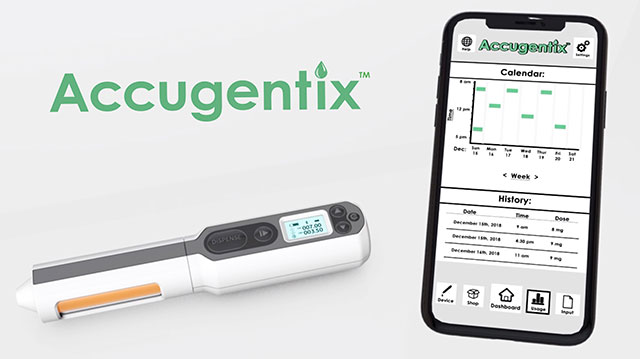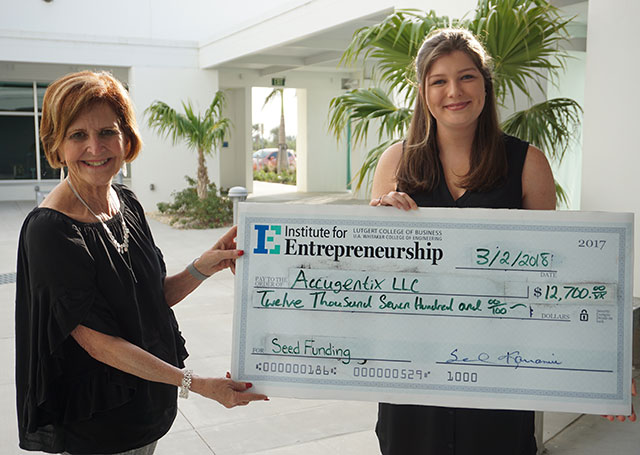The evolving interdisciplinary entrepreneurship program at Florida Gulf Coast University — which includes the new School of Entrepreneurship and the Institute for Entrepreneurship — provides students and alumni with the training, tools, knowledge and mentoring they need to get a business idea off the ground.
All the students have to provide is that innovative business idea — and a lot of personal motivation with a willingness to work. And while majoring in entrepreneurship is always an option, the cross-collaboration between FGCU faculty and staff affords students from all six of FGCU’s colleges the chance to convert their academic background into a business opportunity.

In the case of biology graduate Alainah Hacker, her inspiration came in early 2017 from watching just-legalized medical cannabis have a positive effect on her aunt, who was having difficulty with chemotherapy. Hacker began researching the medicinal benefits of cannabis — her biology research at FGCU focused on medical applications of essential oils — and she discovered patients had no way to properly dose the oils they were using.
“I had never really thought about medical marijuana, but my cousins started giving it to my aunt and it helped her a lot,” said Hacker, a Naples resident who attended Gulf Coast High School. “But then she started having side effects from the THC because she was taking too much of it. There was no way for them to measure how much she should take. They had no clue, and neither did I … and I’m the biology student in the family. Once I got online and started looking into it deeper, I realized everyone was having the same problem.”
Hacker — with the help of mentors and interns — has developed a patent-pending Cannabis Doser System under her startup company, Accugentrix. The doser measures cartridges filled with either CBD or THC oil in milligrams using navigation buttons. An accompanying mobile app will track the user’s intake and help determine the perfect dose. The doser is expected to launch in Florida by the beginning of next year.
“Since medical cannabis isn’t FDA-approved, doctors who prescribe it aren’t allowed to legally give specific doses, only suggestions as to how much to use,” Hacker said. “Users have to figure out the dosage for themselves. Most people who use it for medical purposes use 10- to 50-milligram doses. People getting high are taking a lot more than that.”

With Hacker’s doser, all patients start out with micro doses, then increase their intake in small increments they record through the app. Once they figure out the proper dose for them, the information the app provides will enable the dispensary to furnish the patient with customized oil cartridges.
Since Accugentix is not legally permitted to dispense THC oils, Hacker is looking for medical cannabis companies that are so licensed with which to partner, offering prototype samples of the doser to interested distributors.
“Our target customers are the cannabis dispensaries and growers,” Hacker said, noting that each state has different distribution laws for medical marijuana. In Florida, only growers can dispense their product, while in Pennsylvania, for instance, growers can work with a variety of dispensaries.
“My hope is that the doser will be available to retail users for $100 to $120, but it will be up to the individual dispensaries to set their own prices,” Hacker said.
Meanwhile, Accugentix this month plans to introduce a related AccuHemp website and accompanying iOS app for users of CBD hemp oil, which is freely available online and at retail locations. CBD, or cannabidiol, is extracted from hemp plants and does not produce intoxication like the chemical THC, or tetrahydrocannabinol. Proponents of CBD say it helps alleviate a variety of medical problems without the so-called “high.”
Hacker previously worked in marketing and research and development at Arthrex for about a year and a half while earning her FGCU degree. She started Accugentix in January 2018 — a month after her graduation — by offering a CBD Hemp Oil Calculator in the App Store. The creation was Accugentix’s beta app and is no longer available to download, but users who previously purchased the app can still use it.
Hacker developed Accugentix with the guidance of the Runway Program that has been a key feature of the Institute for Entrepreneurship since 2016. This incubator at the Emergent Technologies Institute gives current FGCU students and alumni who are accepted through an application process access to workspaces, technology and entrepreneurship faculty, staff and mentors. Participants work with an advisor and develop a plan that they can test in the market. At the end of the program, participants have the opportunity to pitch for equity-free seed funding to launch their businesses.
“It took me about a year and a half to get from a brand-new idea in my head to pitching my product in competitions,” said Hacker, whose formal presentations earned almost $27,000 in startup funds: $24,700 total from Runway Program competitions, $1,250 at the 2019 EIX E-fest competition in Minnesota and $1,000 as first runner-up at the 2018 Florida Venture Forum Collegiate Competition.
“Through her tenacity, dedication to learning and openness to feedback, Alainah learned a great deal and discovered that she wanted to be an entrepreneur,” said Sandra Kauanui, director of the Institute for Entrepreneurship and School of Entrepreneurship. “We were able to connect her with a patent attorney who helped her apply for two unique utility patents. Tim Cartwright (chairman of the Tamiami Angel Funds and an FGCU adjunct, among his many professional and board roles) also coached her a great deal. I believe she will be one of our Runway students who will end up being very successful.”
Hacker credits FGCU for much of whatever success Accugentix achieves, which is ironic because she was accepted by and set to transfer to the University of Florida before deciding to remain an Eagle. “UF was way too big … too many classes online,” she said. “I would miss the interaction with my professors, especially in my field of study.”
And she also would have missed out on the jumpstart she got from the Runway Program. “If it wasn’t for them, I would not be where I am,” said Hacker, who also credits FGCU mentors Scott Kelly (Runway Program coordinator) and Mark Bole (entrepreneur-in-residence at the institute) for their guidance. “I had the product idea in my head, but I needed a lot of help with the business side of it.”